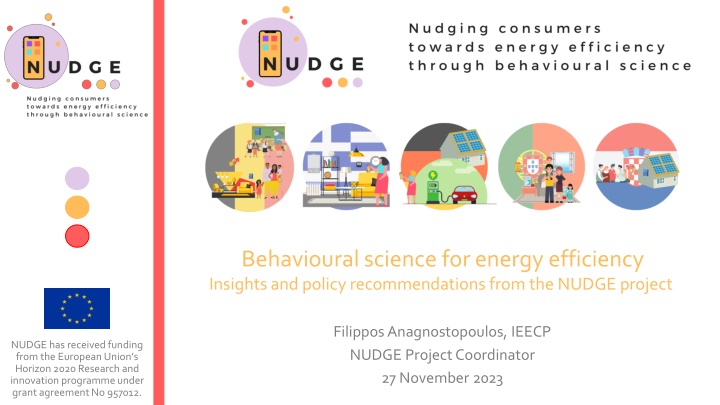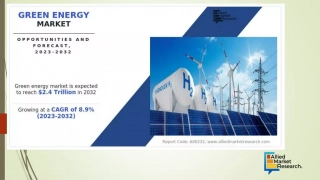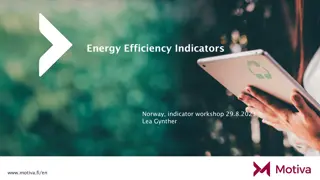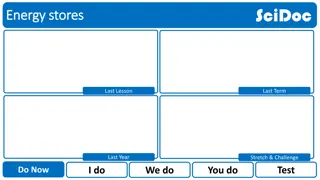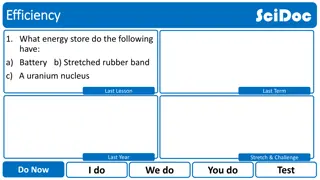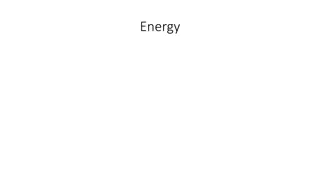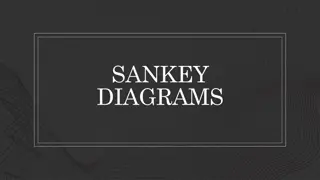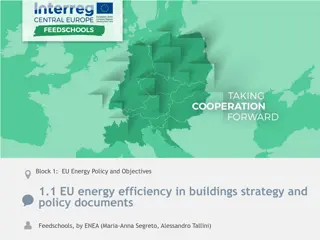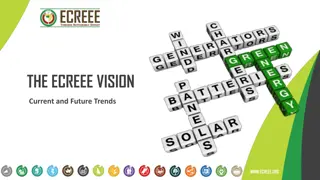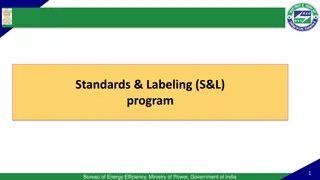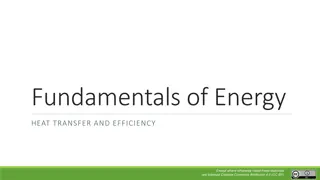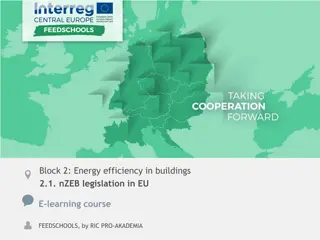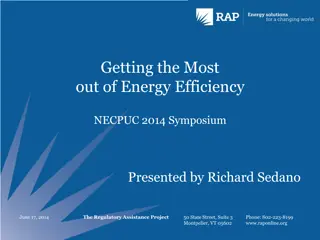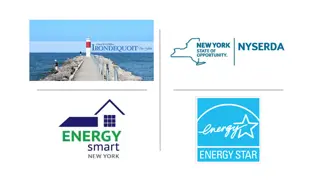Insights and Policy Recommendations for Energy Efficiency in EU
This content delves into the NUDGE project, funded by the EU's Horizon 2020 programme, focusing on behavioral science strategies for enhancing energy efficiency in households and addressing the 2022 energy crisis. It highlights the importance of the Revised Energy Efficiency Directive, outlining measures such as fiscal incentives, access to finance, and targeted advisory services to promote behavioral change. The Annex in the directive also discusses common methods for calculating the impact of policy measures in energy savings.
Download Presentation

Please find below an Image/Link to download the presentation.
The content on the website is provided AS IS for your information and personal use only. It may not be sold, licensed, or shared on other websites without obtaining consent from the author.If you encounter any issues during the download, it is possible that the publisher has removed the file from their server.
You are allowed to download the files provided on this website for personal or commercial use, subject to the condition that they are used lawfully. All files are the property of their respective owners.
The content on the website is provided AS IS for your information and personal use only. It may not be sold, licensed, or shared on other websites without obtaining consent from the author.
E N D
Presentation Transcript
Behavioural science for energy efficiency Insights and policy recommendations from the NUDGE project Filippos Anagnostopoulos, IEECP NUDGE Project Coordinator 27 November 2023 NUDGE has received funding from the European Union s Horizon 2020 Research and innovation programme under grant agreement No 957012.
Behavioural science for energy efficiency Households account for 27% of final energy consumption in the EU in 2021, with natural gas being a major energy source. 11.7% Energy efficiency target compared to the projected energy use for 2030 (based on the 2020 reference scenario) 763 Mtoe Final energy consumption 992.5 Mtoe Primary energy consumption The 2022 energy crisis highlighted the urgent need for effective energy- saving measures, households facing rising energy bills. especially for NUDGE has received funding from the European Union s Horizon 2020 Research and innovation programme under grant agreement No 957012.
RevisedEnergyEfficiencyDirective(EU/2023/1791) energy efficiency improvement means an increase in energy efficiency as a result of any technological, behavioural or economic changes Article 22 (Information and awareness raising) lists a range of instruments and policies to promote behavioural change such as: (a) fiscal incentives; (b) access to finance, vouchers, grants or subsidies; (c) publicly supported energy consumption assessments and targeted advisory services and support for household consumers, in particular people affected by energy poverty, vulnerable customers and, where applicable, people living in social housing; (d) targeted advisory services for SMEs and microenterprises; (e) informationprovision in accessible form to people with disabilities; (f) exemplary projects; (g) workplace activities; (h) training activities; (i) digital tools; (j) engagement strategies. NUDGE has received funding from the European Union s Horizon 2020 Research and innovation programme under grant agreement No 957012.
RevisedEnergyEfficiencyDirective(EU/2023/1791) ANNEX V :COMMON METHODS AND PRINCIPLES FOR CALCULATING THE IMPACT OF POLICY MEASURES deemedsavings,anex-anteapproach basedon the resultsof previous independentlymonitored energy improvementsin similarinstallations. meteredsavings, anexpost approach whereby the savingsare determined byrecording the actual reductionin energyuse, correcting for occupancy,weather, etc scaledsavingsusingengineeringestimates surveyedsavingswhich isusedonlyfor savingsresultingfrom changesin consumerbehaviour (response toadvice,information campaigns,labellingor certification schemesor smart metering) NUDGE has received funding from the European Union s Horizon 2020 Research and innovation programme under grant agreement No 957012.
Nudging as a tool for Energy Efficiency Nudges are subtle changes in the decision-making environment that predictably alter behavior without restricting options or significantly altering economic incentives. They preserve choice and support individuals in making better decisions. Nudges can involve immediate changes in the decision context (like prompts when adjusting heating) or more indirect ones (like showing average national consumption on bills). The effectiveness of various nudges such as social comparisons, feedback, and defaults is a subject of ongoing research and debate. NUDGE has received funding from the European Union s Horizon 2020 Research and innovation programme under grant agreement No 957012.
How to evaluate behavioural interventions NUDGE has systematically assessed and generated insights that help to unleash the potential of behavioral interventions for energy efficiency; Its methods and experience contribute to the generalized use of behavioural interventions as an addition to the policy-making toolbox. Achieved objectives Behavioral interventions tailored to individual psychological and contextual variables. Extensive field trials, implementing mixes of behavior-based interventions A research protocol to measure the impact of the implemented behavioral interventions. Recommendations towards policy makers and relevant stakeholders. NUDGE has received funding from the European Union s Horizon 2020 Research and innovation programme under grant agreement No 957012.
The NUDGE project pilots Smartphone app, web dashboards& smart devices School courses Delivery 2 cohorts 3 typesof nudginginterventions Intervention Sensordata(e.g. energyconsumption) + surveydata+ devicedata Data NUDGE has received funding from the European Union s Horizon 2020 Research and innovation programme under grant agreement No 957012.
Example: Feedback nudge using information Feedback nudge: Households consumers in Germany received information via digital tools (web and app versions), using simple indicators, reference values and color coding NUDGE has received funding from the European Union s Horizon 2020 Research and innovation programme under grant agreement No 957012.
Research protocol to measure the impact of interventions The NUDGE project used a blend of advanced and adaptable methods to evaluate nudges' effectiveness in real- world settings, accounting for the complexities of everyday life Randomised Control Trials to compare how energy use changed over time in different groups those exposed to nudges and the control group. The principal analytic method (Difference-in-Differences) is good at distinguishing the effect of nudges from other parameters such asweather changes or different home setups. Adjusted methods to deal with practical challenges with data gaps or changes in the group of participants. NUDGE used sensor data for actual effects and surveys for perceived effects; and combined these to evaluate nudges' effectiveness. Sensor Data: Collected from devices like smart meters to measure actual changes in energy use. Survey Data: Collected from participants to understand their perceptions and reported behaviors. App Data: Collected from mobile applications, indicating user engagement NUDGE has received funding from the European Union s Horizon 2020 Research and innovation programme under grant agreement No 957012.
Analytic methods to measure the impact of interventions Difference-in-Differences (DiD) Analysis: compares energy use changes over time and between groups (with and without nudges), effectively isolating the impact of nudges by accounting for external influences like weather. Two-way-fixed effects (TWFE) Analysis: controls for variations in data across different households and over time, stabilizing results by removing unrelated variables, although it may not fully adjust for all non-uniform differences. Within-Subject Comparison:applied when continuous sensor data isn t available, or there are challenges with the study design. More statistical methods used for analyzing meter and survey data (t-tests, k-means, anova, random intercept model) to identify and handle outlier values. Data gaps handled by aggregating data, using interpolation methods, and accepting some unbalanced datasets NUDGE has received funding from the European Union s Horizon 2020 Research and innovation programme under grant agreement No 957012.
This is not a lab! The real-life setting of the study presents unique challenges compared to lab experiments, as it involves numerous variables in everyday decision-making . Technical issues and human behaviors have an impact on the quality and reliability of data. Field Trialsettings introduce challenges like confounding factors, learning effects, and varying data quality. Results are influenced by external factors, such as the weather, energy prices, the pandemic, and the energy crisis The randomisation of participants can sometimes lead to unbalanced groups, highlighting the need for representative study groups. Implementing engagement strategies is essentialto maintain participation for the integrity of the study Need to choose methods that accurately test the impact of the chosen behavioural intervention and consider the specific conditions of each exposure group. Balance scientific rigor with the practicalities of real-world energy use. NUDGE has received funding from the European Union s Horizon 2020 Research and innovation programme under grant agreement No 957012.
Positive effects from nudging Positive effects from nudging ENERGY SAVINGS RANGED FROM 3-4% FOR INTERACTIVE NUDGES, UP TO 16 % FOR DEFAULT NUDGES FOR AUTOMATED CONSUMPTION OPTIMIZATION (E.G. EV CHARGING). PARTICIPANTS INTERACTING WITH APPS SHOWED MORE PRONOUNCED NUDGING EFFECTS. NUDGE has received funding from the European Union s Horizon 2020 Research and innovation programme under grant agreement No 957012.
Inconsistent Evidence Inconsistent Evidence THERE WAS NO CONSISTENT EVIDENCE SUPPORTING THE EFFECTIVENESS OF NUDGES ACROSS ALL COUNTRY SETTINGS. CONFOUNDING FACTORS DISTORTED RESULTS (E.G. HIGH PRICES DUE TO THE ENERGY CRISIS 2022). IN EACH PILOT, SOME GROUPS/OUTCOMES SHOWED INSIGNIFICANT OR CONTRADICTORY EFFECTS. NUDGE has received funding from the European Union s Horizon 2020 Research and innovation programme under grant agreement No 957012.
unfavorable time periods (e.g. holidays), Limited interaction with apps, Barriers to Barriers to Energy Energy Savings Savings weather effects can be limiting the effectiveness of nudges (e.g. mild winters in BE and GR lessened the need for heating). Energy literacy is not a guaranteed outcome from nudging. NUDGE has received funding from the European Union s Horizon 2020 Research and innovation programme under grant agreement No 957012.
Recommendations Recommendations 01 02 03 Choose nudges with immediate response (e.g., defaults) to avoid convoluted links towards behavioral change which can decrease the effectiveness and complicate the monitoring. Align nudges and regulatory incentives [otherwise risk offsetting nudging effects] Infield trials, increase the number of households, ensure representative groups, and test fewer interventions. NUDGE has received funding from the European Union s Horizon 2020 Research and innovation programme under grant agreement No 957012.
NUDGE has received funding from the European Union s Horizon 2020 Research and innovation programme under grant agreement No 957012.
